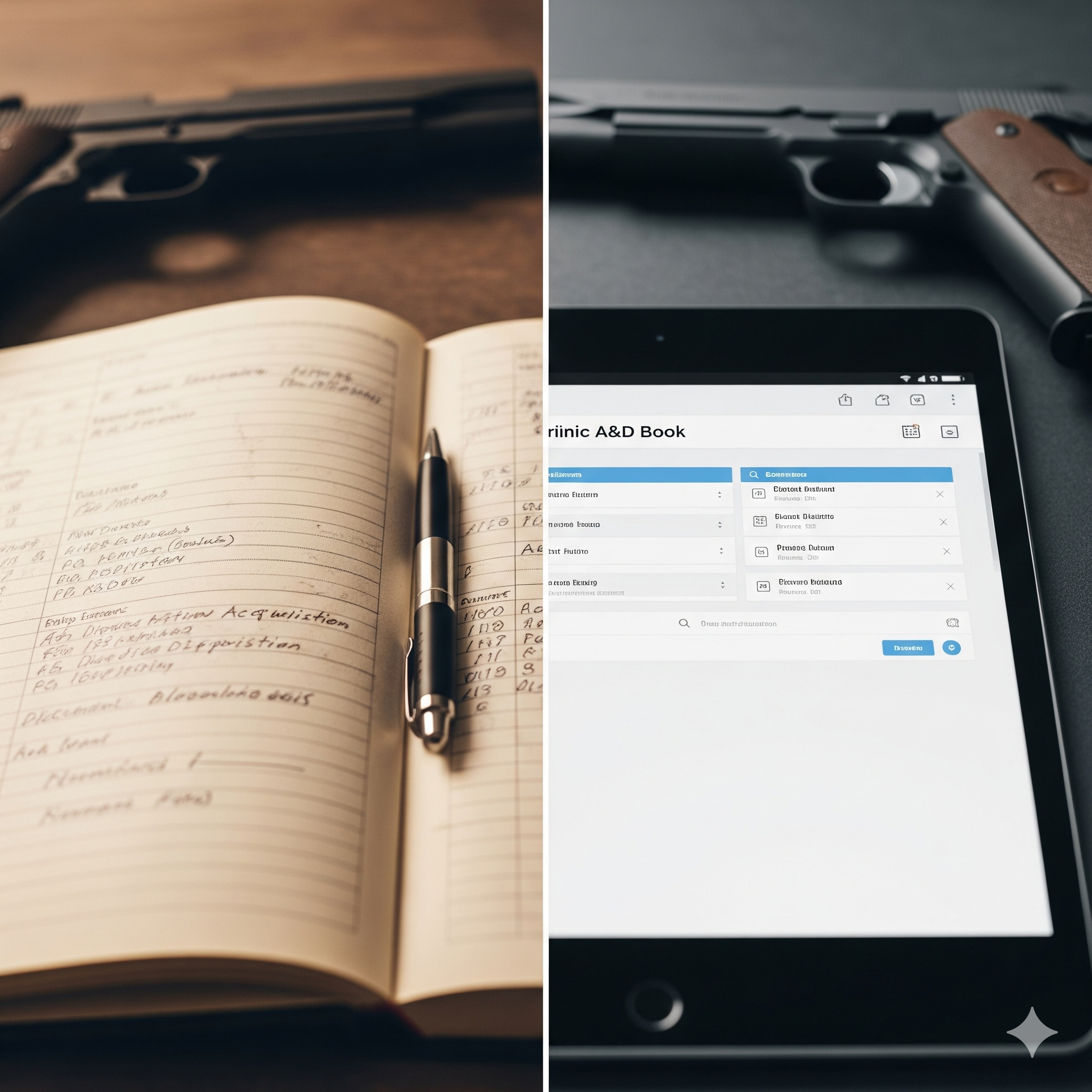
For every Federal Firearms Licensee (FFL), the Acquisition & Disposition (A&D) book, or “bound book,” is the bedrock of compliance. This meticulous record tracks every single firearm that enters and leaves your store. While the traditional paper bound book has been the standard for generations, the digital revolution has introduced a powerful alternative: the electronic A&D book. So, which method is the best fit for your business? Let’s dive deep into a robust comparison of both to help you make an informed decision.
The Paper Bound Book: The Old-School Standard
The paper A&D book is a familiar sight in gun shops across the country. It’s a physical ledger where every firearm transaction is meticulously logged by hand.
Pros:
- Simplicity and Accessibility: The paper bound book is fundamentally low-tech. It doesn’t require an internet connection, software, or hardware. All you need is a pen and the book itself, making it a reliable backup even in the event of a total power outage or system failure.
- Physical Security: A physical book is a tangible asset. It’s stored on-site, providing a sense of control and security that some FFLs prefer.
Cons:
- High Risk of Human Error: This is the single biggest drawback. Illegible handwriting, transposed serial numbers, missed entries, or incorrect dates are common and can lead to serious compliance issues. A single, seemingly minor error can invalidate an entire page, potentially leading to warnings, fines, or even license revocation during an ATF audit.
- Inefficiency and Time Consumption: Manually entering every single detail—manufacturer, model, serial number, caliber, and transaction date—is a slow, tedious, and labor-intensive process. This takes valuable staff time away from sales and customer engagement, directly impacting your bottom line.
- Vulnerability to Damage and Loss: A paper book is a fragile asset. It can be easily lost, stolen, or destroyed by natural disasters like fire or flood. Losing your bound book is one of the most severe compliance violations an FFL can face, with potentially business-ending consequences.
- Auditing and Retrieval Nightmares: When an ATF inspector arrives, a paper bound book audit can be an arduous process. Finding a specific transaction or running a report on a particular firearm requires flipping through hundreds or thousands of pages, a process that is both inefficient and stressful.
The Electronic A&D Book: The Modern, Secure Solution
Electronic A&D books use software to digitize and manage all firearm acquisitions and dispositions. This modern approach is rapidly becoming the industry standard for FFLs committed to efficiency and compliance.
Pros:
- Unparalleled Accuracy and Error Prevention: A robust electronic system uses built-in validation checks to prevent common mistakes. It automatically flags incorrect serial numbers, missing information, or invalid dates, ensuring that your records are clean and audit-ready from the moment of entry.
- Massive Time Savings: With transaction-linked entry and inventory scanning support, acquiring or disposing of firearms becomes far faster and less error-prone. This frees up your staff to focus on what matters most: serving customers and driving sales.
- Enhanced Security and Redundancy: Your data is not at risk of physical damage. It’s stored securely in the cloud with automatic, regular backups. This protects your critical records from fire, flood, theft, and other physical threats. Access is password-protected, and the best systems offer advanced security features like two-factor authentication to prevent unauthorized access.
- Instantaneous Auditing and Reporting: An ATF audit is a breeze with an electronic A&D book. You can instantly generate reports, search for specific firearms by serial number or customer name, and provide auditors with a clean, verifiable record in a fraction of the time it would take with a paper book.
Cons:
- Requires Technology: An electronic system relies on hardware, software, and a reliable internet connection. While most systems offer offline capabilities as a backup, it’s still a point of dependency.
The Ultimate Answer: E4473.com + Bravo Store Systems
While an electronic A&D book is a clear win, not all systems are created equal. The ultimate solution lies in a seamless, integrated platform that automates the entire process, minimizing risk and maximizing efficiency. This is where the powerful combination of E4473 and Bravo Store Systems sets the new industry standard.
E4473 is a leading ATF-compliant platform that digitizes the entire Form 4473 process, ensuring accuracy and a streamlined customer experience. When a customer completes the digital Form 4473, the data is validated in real-time.
The magic happens when you pair this with Bravo Store Systems, an industry-leading all-in-one POS and inventory management solution. Upon a sale or acquisition within Bravo, the information automatically and instantly populates your digital A&D book. This integration completely eliminates the need for manual data entry, removing the risk of human error and saving your staff countless hours. The result is a bound book that is always accurate, secure, and ready for an audit.
By leveraging this powerful synergy, you’re not just switching from paper to digital—you’re implementing an end-to-end compliance and operational solution that protects your FFL and positions your business for future growth.



